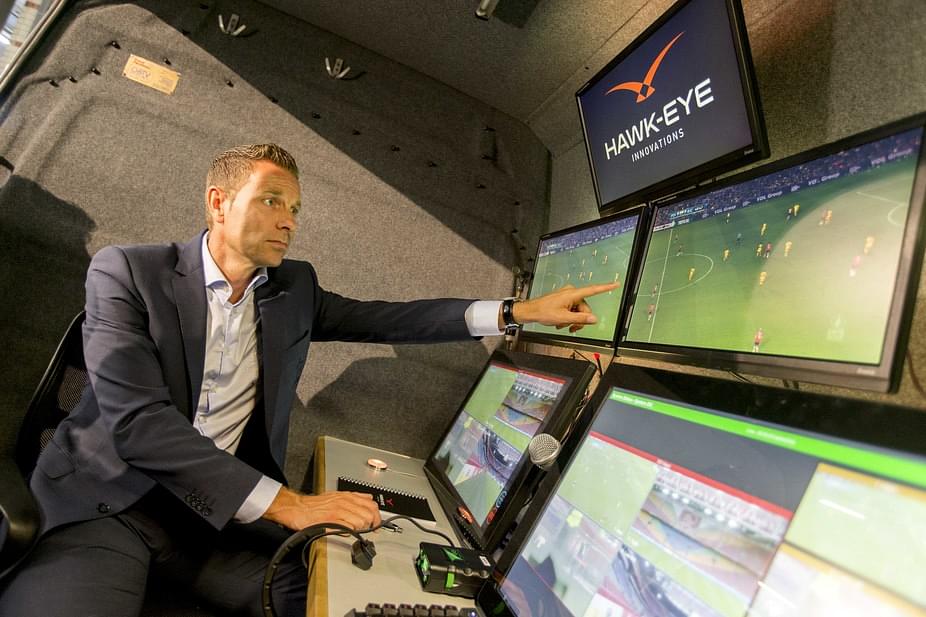Football has been around for centuries now, and the past semi-century has seen it become one of the most popular sports in the world. Though the game overall hasn’t changed a lot, there have been significant strides in rules (such as the changes in the offside rule) as well as playing strategies (the tiki-taka of Johan Cryff). In an attempt to drag football into the 21st century, the Goal-Line-technology was introduced in 2012 and has been a huge success. The next big thing on the cards – the Video Assistant Referee (VAR) – which was implemented as a trial run by the official football body during the Confederations Cup, Russia 2018.
The world of football took a peek into another field sport – hockey and decided to adopt a successful method of refereeing present in the international tournaments – the video referee. Along with the traditional ones on the field, the role of these referees were to closely monitor the match and bring to attention any incidents the field referee has missed out on – be it regarding offsides or whether the hard ball has gone out of play. A similar approach was introduced in football – two more referees at the side lines watching the game closely from their monitors.
This new system aimed to enhance the quality of football played by pointing out the erroneous/missed decisions taken by referees so that the game flows in a fair manner. But is this system really suited for football?
The VAR was active throughout the tournament, but its usage stood out in a few matches. The first decision taken was when Portugal were denied a goal- Pepe’s shot which hit the net after a ricochet off the cross bar off Ronaldo’s free kick was deemed offside. The delay was probably worth the wait, with the final decision taken being a correct one.

The next one was just 2 days away, in the Group A face off between New Zealand and Mexico. New Zealand’s Ryan Thomas and Michael Boxall at the center of it with Mexico’s Hector Hererra and Diego Reyes, set off a melee. Before cooler heads could prevail, both sides clashed with head butts, shoves and swings to the face visible on the broadcast. The referee, after long conversations with his assistants by the monitor decided to show a yellow card to one of the players involved and resumed the game. A few moments later though, he stopped play to brandish two more yellow cards and players from both sides could be seen getting frustrated as they clearly want to get on with the match.
ALSO READ : Robin Van Persie to return to the Premier League?
Next, a goal for Mexican Eduardo Vargas was denied after a review, from which the referee decided that Vargas was offside. An extremely close and controversial call- Chile were denied what would’ve been announced a goal possibly every other day.
Cameroon was again involved in the next incident, this time against Germany. In scenes reminiscence of Andre Mariner sending off Kieran Gibbs instead of Alex Oxlade-Chamberlain, the official eventually came to the right conclusion. The initial intent of the referee was to decide whether a foul he had given a yellow card to deserved a red or not. Upon review, a red card was furbished. Despite a look at the screens, the referee had no clue about the fact that he had booked Sebastien Siani when it was Ernest Mabouka who challenged for the ball. It took a lot of stoppage time as he was called back for a second review, and the wrong was righted.
The referee ended up giving a free kick to Germany just by the touchline. But controversy struck when Jara was produced a yellow card when a red card was deemed necessary by many football pundits. Many claimed this to be a failure of the VAR as a whole- not furnishing a red card despite a review. Later on, we could see many Chileans request the referee to take a review when Alexis Sanchez was not awarded a penalty as he went down in the box.
Mixed reactions were triggered by its usage in the tournament- from ex-Arsenal defender Lee Dixon who claimed that the VAR was in shambles to the Fifa-president Gianni Infantino who signalled that he was in favour of the system during next year’s World Cup.
The author’s take:

Video Assistant Referee looks good on paper. A lot of pros. The system enables referees to take a second look before taking crucial decisions during a match. The pressure on the referees may have dipped a little bit – he can always seek help from his assistants by the side lines. Mistakes such as sending off the wrong player won’t happen (hopefully). Tough offside calls can be made with accuracy. Players who get into fights can be punished properly. Fouls can be reviewed and decisions taken. This system can even go as far as to ensure players do not dive anymore.
On the flip side, the referee now has to make an extra decision under pressure – whether to take a review or not (the Chileans requesting the referee in the dying minutes of the final). The system also does not take into account the amount of time it takes for the process. Many huge teams in Europe today play counter-attacking and high intensity football – from the Likes of Real Madrid to Tottenham. The flow and momentum of the game play an important role. Stoppage of 2-3 minutes can have a heavy impact on the game. More and more stoppage time will be played now (I admit that I do not know if this is a good or a bad thing).
Football is an exciting game because of its continuity and unexpected nature. Going by FIFA’s comments, the system is going to expand all across Europe within the coming years. But if such a decision is made, it is easy to see the need for its improvement, and possibly modification to ensure the amount of time stopped is reduced. But one question keeps flashing in my mind which I have no answer to- doesn’t the unpredictiveness of slight human error and controversial decisions bring beauty to the game of football?



